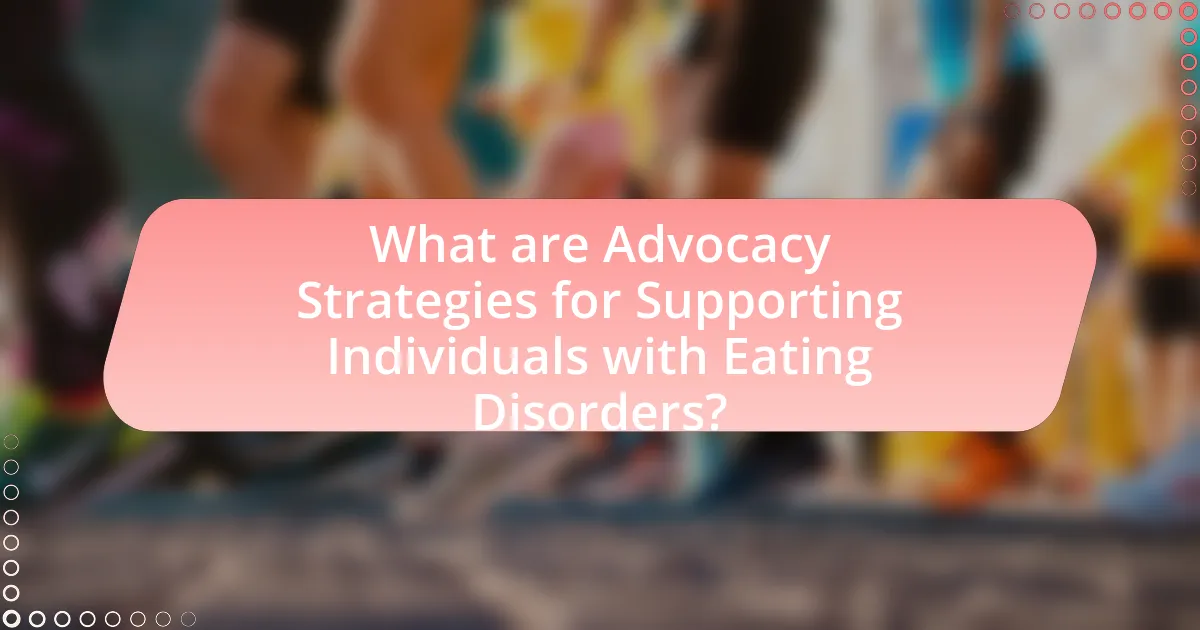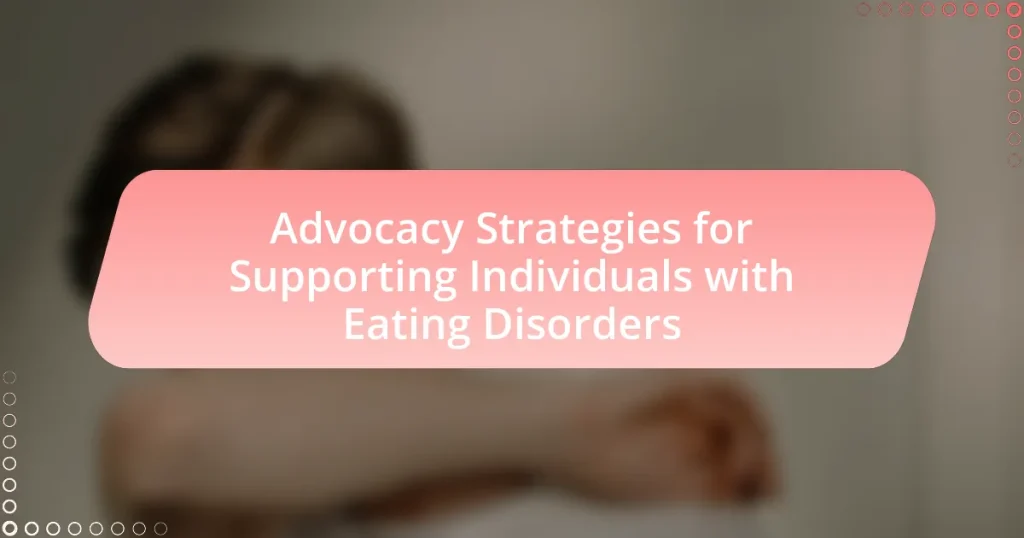Advocacy strategies for supporting individuals with eating disorders encompass raising awareness, promoting access to treatment, and fostering supportive environments. Effective advocacy is essential for improving healthcare policies, increasing funding for research, and enhancing support systems, which are critical for recovery. Key components of successful advocacy include clear messaging, stakeholder engagement, and evidence-based approaches, while community involvement and education campaigns play significant roles in reducing stigma and mobilizing support. Challenges such as stigma and resource limitations hinder advocacy efforts, but collaboration with healthcare professionals and the use of technology can enhance outreach and effectiveness.

What are Advocacy Strategies for Supporting Individuals with Eating Disorders?
Advocacy strategies for supporting individuals with eating disorders include raising awareness, promoting access to treatment, and fostering supportive environments. Raising awareness involves educating the public about the signs and symptoms of eating disorders, which can lead to early intervention and better outcomes. Promoting access to treatment means advocating for insurance coverage and resources that facilitate access to mental health services, as studies show that timely treatment significantly improves recovery rates. Fostering supportive environments includes creating safe spaces in schools and communities where individuals can discuss their struggles without stigma, which is essential for recovery, as supportive social networks have been linked to better mental health outcomes.
Why is advocacy important for individuals with eating disorders?
Advocacy is crucial for individuals with eating disorders because it raises awareness, promotes understanding, and fosters access to necessary resources and treatment. Effective advocacy can lead to improved healthcare policies, increased funding for research, and better support systems, which are essential for recovery. For instance, studies show that advocacy efforts have resulted in legislative changes that enhance mental health services, directly benefiting those affected by eating disorders.
What role do advocates play in the recovery process?
Advocates play a crucial role in the recovery process for individuals with eating disorders by providing support, resources, and guidance tailored to their specific needs. They help individuals navigate treatment options, connect with healthcare professionals, and access community resources, which can significantly enhance the recovery journey. Research indicates that advocacy can lead to improved treatment outcomes, as advocates often empower individuals to voice their needs and preferences, fostering a more personalized approach to care. For instance, studies show that individuals who engage with advocates report higher satisfaction with their treatment and a greater sense of agency in their recovery process.
How can advocacy improve access to treatment for eating disorders?
Advocacy can improve access to treatment for eating disorders by raising awareness, influencing policy changes, and increasing funding for mental health services. By educating the public and healthcare professionals about the prevalence and seriousness of eating disorders, advocacy efforts can reduce stigma and encourage individuals to seek help. For instance, campaigns that highlight the need for comprehensive treatment options can lead to legislative changes that mandate insurance coverage for these services. According to the National Eating Disorders Association, advocacy initiatives have successfully led to increased state funding for eating disorder treatment programs, demonstrating a direct correlation between advocacy efforts and improved access to care.
What are the key components of effective advocacy strategies?
The key components of effective advocacy strategies include clear messaging, stakeholder engagement, and evidence-based approaches. Clear messaging ensures that the advocacy goals are communicated effectively to the target audience, which is crucial for raising awareness and mobilizing support. Stakeholder engagement involves building relationships with individuals and organizations that can influence policy or public opinion, thereby amplifying the advocacy efforts. Evidence-based approaches rely on data and research to support claims and recommendations, making the advocacy more credible and persuasive. For instance, studies show that advocacy campaigns that utilize data-driven strategies are more successful in achieving policy changes, as evidenced by the National Eating Disorders Association’s initiatives that led to increased funding for treatment programs.
How can education and awareness campaigns support advocacy efforts?
Education and awareness campaigns can significantly enhance advocacy efforts by informing the public about eating disorders, thereby fostering understanding and empathy. These campaigns provide critical information that helps to dispel myths and reduce stigma associated with eating disorders, which is essential for creating a supportive environment for affected individuals. For instance, a study published in the Journal of Eating Disorders found that increased awareness leads to higher rates of early intervention and treatment, as individuals are more likely to seek help when they understand the signs and consequences of these disorders. Furthermore, education initiatives can mobilize community support and encourage policy changes by highlighting the need for resources and services for those affected.
What role does community involvement play in advocacy strategies?
Community involvement is crucial in advocacy strategies as it fosters collective action and amplifies the voices of individuals affected by eating disorders. Engaging community members creates a support network that enhances awareness, promotes education, and drives policy change. For instance, studies show that grassroots movements, which rely on community participation, have successfully influenced legislation related to mental health and eating disorders, demonstrating the power of localized advocacy efforts. By mobilizing community resources and expertise, advocacy strategies become more effective in addressing the needs of individuals with eating disorders.
What challenges do advocates face when supporting individuals with eating disorders?
Advocates face significant challenges when supporting individuals with eating disorders, primarily due to stigma, lack of resources, and the complexity of the disorders themselves. Stigma surrounding eating disorders often leads to misunderstanding and discrimination, making it difficult for advocates to gain support from the community and healthcare systems. Additionally, limited access to specialized treatment resources can hinder effective advocacy, as many individuals may not receive the necessary care. The complexity of eating disorders, which often co-occur with other mental health issues, complicates the advocacy process, requiring advocates to navigate multifaceted treatment needs and coordinate with various healthcare providers. These challenges highlight the need for comprehensive support systems and increased awareness to improve advocacy efforts.
How can stigma surrounding eating disorders hinder advocacy efforts?
Stigma surrounding eating disorders significantly hinders advocacy efforts by perpetuating misconceptions and discouraging open dialogue. This stigma often leads to a lack of understanding about the complexities of eating disorders, which can result in inadequate support and resources for affected individuals. For instance, a study published in the International Journal of Eating Disorders found that stigma can prevent individuals from seeking help, as they fear judgment or discrimination, ultimately reducing the effectiveness of advocacy campaigns aimed at raising awareness and promoting treatment options.
What are common misconceptions about eating disorders that advocates must address?
Common misconceptions about eating disorders include the belief that they only affect young women, that they are a choice or a phase, and that individuals with these disorders are always underweight. Eating disorders can affect people of all genders, ages, and body types; research indicates that approximately 10 million men in the U.S. will experience a clinically significant eating disorder at some point in their lives. Furthermore, eating disorders are complex mental health conditions influenced by various factors, including genetics and environment, rather than mere lifestyle choices. Lastly, many individuals with eating disorders may be of normal weight or even overweight, as the disorders manifest in diverse ways, highlighting the need for advocates to clarify these misconceptions to promote understanding and support.
How can advocates collaborate with healthcare professionals?
Advocates can collaborate with healthcare professionals by establishing communication channels that facilitate information sharing and mutual understanding. This collaboration can involve regular meetings, joint training sessions, and the development of shared resources that address the needs of individuals with eating disorders. For instance, a study published in the Journal of Eating Disorders highlights that interdisciplinary teams, which include advocates and healthcare providers, improve treatment outcomes by integrating diverse perspectives and expertise. This evidence supports the effectiveness of collaboration in enhancing care for individuals facing these challenges.
What strategies can be used to build partnerships with medical providers?
To build partnerships with medical providers, organizations should focus on establishing clear communication channels and demonstrating the value of collaboration. Effective strategies include hosting educational workshops that inform providers about eating disorders, sharing evidence-based resources, and creating referral networks that facilitate patient access to specialized care. Research indicates that collaborative care models improve patient outcomes; for instance, a study published in the Journal of Eating Disorders found that integrated treatment approaches significantly enhance recovery rates for individuals with eating disorders. By fostering relationships through ongoing dialogue and mutual support, organizations can strengthen partnerships with medical providers, ultimately benefiting patients.
How can advocates ensure that healthcare professionals are informed about eating disorders?
Advocates can ensure that healthcare professionals are informed about eating disorders by providing targeted educational resources and training programs. These initiatives can include workshops, seminars, and online courses that focus on the latest research, diagnostic criteria, and treatment options for eating disorders. For instance, the National Eating Disorders Association offers resources that help healthcare providers recognize symptoms and understand the complexities of these conditions. Additionally, advocates can collaborate with medical institutions to integrate eating disorder education into medical school curricula, ensuring that future healthcare professionals are well-equipped to address these issues.
What specific advocacy strategies can be implemented at different levels?
Advocacy strategies for supporting individuals with eating disorders can be implemented at three levels: individual, community, and policy. At the individual level, strategies include providing education and resources to empower those affected, fostering peer support groups, and encouraging open conversations about eating disorders. At the community level, initiatives can involve organizing awareness campaigns, collaborating with local health services to improve access to treatment, and training community members to recognize signs of eating disorders. At the policy level, advocacy can focus on lobbying for better mental health services, promoting legislation that mandates insurance coverage for eating disorder treatment, and advocating for the inclusion of eating disorders in public health initiatives. These strategies are supported by research indicating that comprehensive advocacy efforts can significantly improve awareness, access to care, and overall outcomes for individuals with eating disorders.
How can grassroots movements effectively raise awareness about eating disorders?
Grassroots movements can effectively raise awareness about eating disorders by leveraging community engagement and social media campaigns. These movements often mobilize local communities to share personal stories, which humanizes the issue and fosters empathy. For instance, campaigns like National Eating Disorders Awareness Week utilize social media platforms to disseminate information and encourage discussions, reaching millions and increasing visibility. Research indicates that personal narratives can significantly impact public perception and understanding of mental health issues, making them a powerful tool for advocacy.
What role do policy changes play in supporting individuals with eating disorders?
Policy changes play a crucial role in supporting individuals with eating disorders by establishing frameworks that ensure access to necessary treatment and resources. For instance, legislation that mandates insurance coverage for mental health services, including eating disorder treatment, significantly increases the likelihood that individuals will receive timely and appropriate care. According to the National Eating Disorders Association, states that have implemented such policies report higher rates of treatment access and improved health outcomes for affected individuals. Additionally, policy changes can promote awareness and education about eating disorders, reducing stigma and encouraging individuals to seek help.
How can technology enhance advocacy efforts for eating disorders?
Technology can enhance advocacy efforts for eating disorders by facilitating communication, raising awareness, and providing resources. Digital platforms enable organizations to reach a broader audience through social media campaigns, online support groups, and educational webinars, effectively disseminating information about eating disorders. For instance, a study published in the Journal of Eating Disorders found that social media campaigns significantly increased public awareness and understanding of eating disorders, leading to higher engagement in advocacy initiatives. Additionally, mobile applications can offer tools for tracking recovery progress and connecting individuals with mental health professionals, further supporting advocacy goals.
What online platforms can be utilized for advocacy campaigns?
Online platforms that can be utilized for advocacy campaigns include social media networks, websites, and email marketing services. Social media platforms like Facebook, Twitter, and Instagram allow for broad outreach and engagement with diverse audiences, facilitating the sharing of information and mobilization of supporters. Websites can serve as central hubs for resources, information, and calls to action, while email marketing services enable targeted communication with supporters and stakeholders. According to a 2021 report by the Pew Research Center, 69% of adults in the U.S. use social media, highlighting its effectiveness for advocacy efforts.
How can social media be leveraged to spread awareness and support?
Social media can be leveraged to spread awareness and support for individuals with eating disorders by creating targeted campaigns that engage users through informative content, personal stories, and community support. Platforms like Instagram and Twitter allow organizations to share statistics, educational resources, and testimonials that highlight the realities of eating disorders, thereby increasing visibility and understanding. For instance, the National Eating Disorders Association (NEDA) utilizes social media to promote awareness campaigns, reaching millions and fostering a sense of community among those affected. Research indicates that social media can significantly influence public perception and encourage individuals to seek help, as evidenced by a study published in the Journal of Eating Disorders, which found that online support groups can improve recovery outcomes.
What are some best practices for individuals advocating for those with eating disorders?
Best practices for individuals advocating for those with eating disorders include promoting a non-judgmental environment, using empathetic communication, and providing accurate information about eating disorders. Creating a safe space encourages individuals to share their experiences without fear of stigma. Empathetic communication fosters trust and understanding, which is essential for effective advocacy. Providing accurate information, such as statistics from the National Eating Disorders Association indicating that 20 million women and 10 million men in the U.S. will experience an eating disorder at some point in their lives, helps to educate others and dispel myths surrounding these conditions.
How can advocates effectively communicate with individuals affected by eating disorders?
Advocates can effectively communicate with individuals affected by eating disorders by employing empathetic listening and non-judgmental language. Empathetic listening involves fully engaging with the individual’s feelings and experiences, which fosters trust and openness. Non-judgmental language helps create a safe space, allowing individuals to express themselves without fear of criticism. Research indicates that supportive communication can significantly improve the willingness of individuals to seek help and engage in recovery processes. For instance, a study published in the Journal of Eating Disorders highlights that individuals who experience compassionate communication are more likely to feel understood and supported, which is crucial for their recovery journey.
What resources are available for advocates to enhance their strategies?
Advocates can enhance their strategies through various resources, including training programs, toolkits, and online platforms. Training programs, such as those offered by the National Eating Disorders Association (NEDA), provide essential skills and knowledge for effective advocacy. Toolkits, like the “Advocacy Toolkit” from the Academy for Eating Disorders, offer practical guidance on how to engage with policymakers and raise awareness. Online platforms, including social media and advocacy websites, facilitate networking and sharing of best practices among advocates. These resources collectively empower advocates to implement informed and impactful strategies in their efforts to support individuals with eating disorders.


